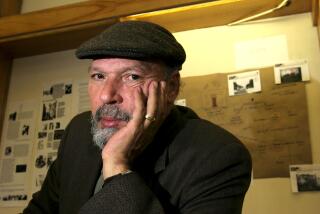Woodrow Wilson and the Current W
- Share via
History hooks you most when exhuming the past and relating it to the present.
That happens in a new “American Experience” two-parter on Woodrow Wilson, the nation’s 28th president, who in some ways brings to mind, of all fellows, George W. Bush. Having a different agenda, this documentary doesn’t identify and connect these threads, but some viewers surely will.
Although both rose to the White House from governorships, outwardly the two couldn’t be more unalike. Wilson was a college professor who became president of Princeton at age 46, a job fitting his cerebral exterior accentuated by ever-present steel-rimmed glasses. Bush is a homespun silk hat, a Texan and Yale alum of such modest academic distinction that political foes have seen his intellect as a fat bull’s-eye.
Wilson’s austere, aloof persona aside, however, we learn from this absorbing PBS work by Carl Byker that he was a deeply passionate Georgian who grew up as baseball-loving Tommy Wilson, and only in his 20s began using his middle name, Woodrow, because it sounded more distinguished. He was an idealist, we hear, but also a pragmatic politician.
Like Bush, moreover, Wilson was devoutly religious, to the extent that he saw himself as “the instrument of God.” Like the current president, also, Wilson was domestic-minded when assuming office in 1913 and, says one historian here, had to “learn foreign policy by the seat of his pants.”
That bell tolled for Bush Sept. 11, a daunting challenge he has risen to incisively.
For Wilson, it was World War I, which began as a European conflict in which the U.S. remained neutral, with the president having been deeply shaken by the Civil War carnage he witnessed as a young boy.
Yet pressure on the U.S. to join the English and French intensified after 128 Americans sank with the passenger ship Lusitania when it was torpedoed by a German sub in 1915. Two years later, America’s doughboys were in Europe battling “the Hun.”
Like the Republican Bush as well, notes narrator Linda Hunt, the Democrat Wilson faced a Senate in which the opposing party held a crucial one-vote edge. This Senate would hand Wilson a devastating defeat in rejecting his plan for a postwar international forum known as the League of Nations.
A forerunner of the United Nations, it was a grand concept of a globe whose conflicts would be settled without war. And a badly ailing Wilson’s futile whistle-stop speaking tour to rally support for it across America is captured magnificently here by old newsreel footage and seamless reenactments. As is his distress over the Versailles Peace Treaty’s harsh terms, dictated by England and France, that sowed in defeated Germany seeds of discontent that would ripen that nation for takeover by Adolf Hitler and his brown-shirt bullies.
Although Wilson’s presidency is given generally good marks by historians, deep ruts surface as well. Paralleling another future White House, an old affair comes back to haunt him. More significantly, we hear him criticized for suspending civil liberties during the war, and for his opposition to racial integration. Despite having two strong women as wives, moreover, he is seen here as no friend of suffragettes.
His first wife, Ellen, raised the job of first lady “to a whole new level” before her death, viewers are told. And the second, Edith, became what is termed a “shadow president” in 1919 as her husband lay paralyzed by a massive stroke for a month, and a “White House cover-up” kept the nation uninformed about his true condition.
This amazing and frightful episode never fully emerges here from its own shadow, unfortunately, even though historian John Milton Cooper calls it “the worst crisis of presidential disability in American history,” with the first lady becoming a “kind of regent” who cut off access to her husband. “She was very specific that she never made a decision on her own,” Cooper adds, “but we all know that whoever controls access to the president to some extent ... is the president.”
In 2001, the news channels and talk radio would be all over her, making the study of Wilson from today’s perspective all the more fascinating and seductive.
*
Part 1 of PBS’ “American Experience,” “Woodrow Wilson: A Passionate Man,” airs Sunday at 9 p.m. on KCET-TV; Part 2, “Woodrow Wilson: The Redemption of the World,” airs at the same time the following Sunday.
More to Read
The complete guide to home viewing
Get Screen Gab for everything about the TV shows and streaming movies everyone’s talking about.
You may occasionally receive promotional content from the Los Angeles Times.






